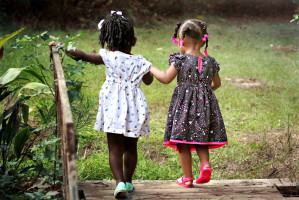
In the presence of Queen Máxima of the Netherlands, representatives of the Princess Máxima Center for paediatric oncology in Utrecht, the Hopp Children's Cancer Center Heidelberg (KiTZ) and the Institut Curie in Paris signed a memorandum on strategic collaboration in European paediatric oncology in The Hague today (Thursday). The 'EU CAN KIDS' (European Alliance for a Childhood Without Cancer) alliance forged between KiTZ and Princess Máxima Center in 2021 is thus being expanded to include another European partner. The alliance's research fund, financed with donations of €3 million every year, is intended to give a decisive boost to European childhood cancer research in order to develop therapies with fewer side effects that are specifically tailored to children.
The signing at the Mauritshuis in The Hague took place in the presence of Queen Máxima, namesake of the Princess Máxima Center. Her presence underscored the importance of the research centers' dedication to helping children with cancer across Europe and supports the success of the collaboration between the three centers.
Each year, 21,000 children and adolescents across Europe are diagnosed with cancer. Roughly one in five cannot be cured by the current standard therapies, and over 7,000 do not survive. Young cancer patients also face significant long-term consequences from treatment: by 2025, Europe is expected to have over half a million survivors of childhood and adolescent cancer, more than half of whom will suffer from treatment-related long-term effects.
The alliance aims to drive forward new treatment approaches in immunotherapy and targeted therapy for children and to establish patient-specific lab models. These allow replication of individual patients’ tumours in the lab, where their responses to specific drugs can be tested in advance. Expanding infrastructure and promoting leading talent in paediatric cancer research are also key priorities. These initiatives will also support cross-border use of anonymised patient data and tumour samples for research.
‘Since founding our alliance, we’ve launched 29 cross-border research and infrastructure projects with a total of 5 million euros. Thanks to our partnership we were able to overcome administrative and financial hurdles,’ explains René Medema, Scientific Director at the Princess Máxima Center. ‘Our work together includes research into new treatments for childhood leukaemia, investigating the causes of particularly aggressive solid tumours, and finding ways to reduce the long-term side effects of childhood cancer therapies.’
At the signing of the alliance in The Hague, the testimony of 17-year-old Evy highlighted the importance of modern personalised diagnostic and therapeutic options for young cancer patients. Evy was 14 when she was diagnosed with leukaemia. After standard therapies were no longer effective for her, she was treated with a cellular immunotherapy in a clinical trial setting and was able to overcome her illness. She is now an ambassador for T2evolve, an initiative that aims to accelerate the development of immunotherapies and improve access to them. She is also a member of the patient advisory board at the Princess Máxima Center.
‘Modern cancer therapies with fewer side effects are especially crucial for children and adolescents, even if the overall numbers are much lower than in adults,’ says Stefan Pfister, Director of KiTZ, Department Head at the German Cancer Research Center, and paediatric oncologist at Heidelberg University Hospital. He sees urgent need for action in paediatric oncology and cancer research: ‘Cure rates for young cancer patients have barely improved over the past 20 to 30 years, partly because there’s no commercial incentive to develop new therapies. Academic research, therefore, leads the way and relies on collaboration and shared resources to build a modern, cross-border paediatric oncology, so that children throughout Europe can access new treatments as quickly as possible.’
The inclusion of the French Institut Curie as the third center of excellence in the ‘EU CAN KIDS’ alliance marks a vital step forward in strengthening European paediatric oncology, says Olivier Delattre, Director of the SIREDO paediatric center at Institut Curie: ‘As a leading basic research center and comprehensive cancer center, Institut Curie develops cutting edges strategies for research and treatment for childhood cancers. We’re thrilled to partner with the Hopp Children's Cancer Center Heidelberg and Princess Máxima Center in Utrecht to create the foundation for the future of paediatric cancer care across borders.
Source: Princess Máxima Center
The World Cancer Declaration recognises that to make major reductions in premature deaths, innovative education and training opportunities for healthcare workers in all disciplines of cancer control need to improve significantly.
ecancer plays a critical part in improving access to education for medical professionals.
Every day we help doctors, nurses, patients and their advocates to further their knowledge and improve the quality of care. Please make a donation to support our ongoing work.
Thank you for your support.